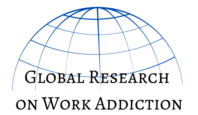Denial of the problem
Један од најважнијих изазова који се односи на лечење зависности од рада је порицање и отпор тражењу лечења међу онима којима би то могло бити потребно. Генерално, већина зависних појединаца не препознаје свој проблем нити тражи помоћ; међутим, клиничари су тврдили да је овај проблем још израженији међу зависницима од рада јер је њихово понашање подржано високом вредношћу која се придаје напорном раду у индустријализованим друштвима.
Студија comparing perceptions between couples showed that less than 50% of individuals identified as work addicts by partners self-identified as addicted to work.
A quantitative content analysis of frequency of different sources employed in articles in daily newspapers from Finland, Italy, and Poland from the years 1991, 1998 and 2011 showed that on average work addiction was mentioned about 12 times less often than alcohol addiction. On average it was mentioned in 3.33% of the articles in comparison to 39.9% of articles mentioning alcohol addiction.
Studies on nationally representative samples of general population in Poland showed that work addiction is considered considebarly less serious and dangerous addiction than alcohol, drug addiction, smoking ciggaretes or gambling addiction. Participants were asked about their opinions about particular addictions. They rated them on a scale from 1 “harmless habit” to 10 “life-threatening addiction”. Work addiction score was about 6 on average, while alcohol and drug addiction had average scores above 9. However, a clear trend of slowly growing recognition of dangers related to work addiction can also be absorved. In each consecutive sample work addiction was rated higher. From 5.8 in 2011, 6.0 in 2015 to 6.2 in 2019. This trend was not present for other behavioral addictions such as internet, gambling or shopping addiction.
